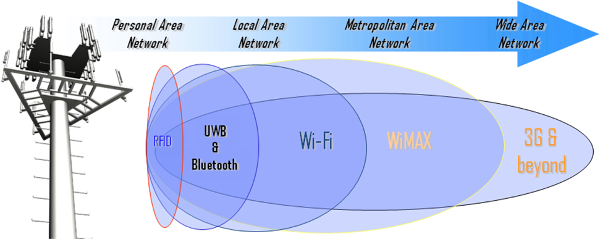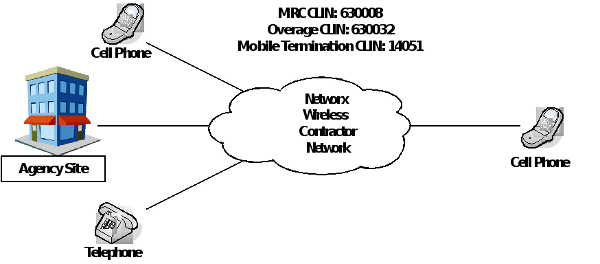CPCS provides Agency users with wireless services for their mobile terminals such as cellular phones, wireless-enabled notebook computers, and other personal devices. This service can be used for applications such as voice, data, Short Messaging Services (SMS), Multimedia Messaging Services (MMS) and Internet Services. The CPCS contractor provides the wireless network.
The CPCS contractor's wireless network interoperates with:
The services and bandwidth provided depends on the characteristics of the mobile terminals and the technology used in the contractor's wireless network and service platforms, ranging from 2nd generation (2G) to 2.5G/3G wireless and beyond. The 2.5G/3G networks (and beyond) support IP packet-mode transmission.
The figure below shows a span of wireless technologies, including Personal Area Network (PAN), Local Area Network (LAN), Metropolitan Area Network (MAN), and Wide Area Network (WAN). CPCS operates primarily at the right side of the chart.

Short Messaging Services (SMS), a feature of CPCS, provides the capability to send and receive text messages. The text can comprise of any alphanumeric characters; each short message may be up to 160 characters in length. Additionally, SMS supports interconnection with different message sources and public destinations including Email, paging, and instant messaging (IM).
Multimedia Messaging Service (MMS), a feature of CPCS, provides the capability to send and receive multimedia, such as pictures, streaming video, sound, and graphics.
CPCS supports technical capabilities that are available in commercial offerings. These capabilities include:
These and other service capabilities are detailed in Section C.2.14.1.1.4 Technical Capabilities of the Networx contracts.
CPCS also offer features that complement the basic service. These features are described in Section C.2.14.1.2.1 Features of the Networx contracts.
* These optional features may not be provided by all Networx contractors.
CPCS is similar to the FTS2001 cellular service. Each Networx contractor may provide variations or alternatives to the offering and pricing for CPCS. The specific details can be found within each contractor's Networx contract and pricing notes for CPCS.
For more information on the general CPCS specifications and requirements, please refer to Section C.2.14.1 of the Networx contract for technical specifications and Section B.2.14.1 for pricing.
CPCS provides Agency users with wireless services for their mobile terminals including cellular phones, laptops, and PDAs. CPCS supports applications such as voice, data, Short Messaging Services (SMS), and Multimedia Messaging Services (MMS).
CPCS is ordered by selecting the type of plan: voice or data (or voice/data combination such as voice with tethering). The Home service area (national plan coverage) includes the contractor's CONUS coverage and may include additional country/jurisdiction IDs. Home service area is determined by the user's primary business address and/or zip code. Roaming charges apply to originating or receiving calls outside the Home service area. International roaming charges apply. Night/weekend and in-network mobile-to-mobile calling are included in the plans. An additional charge per six-second usage may apply for calls that terminate to a non-domestic wireless handset or terminal.
CPCS is similar to FTS2001 Cellular Communications. For Wireless Access Priority service, a subscription is required. There is a one time charge and a monthly recurring charge for subscription; there are additional usage charges per minute. These charges are not part of this contract; additional details are available at http:/wps.ncs.gov/.
Price components required for CPCS are:
** These features are Not Separately Priced and are included in the basic service. These features do not have CLINs and are not in the unit pricer.
*** Some or all price components are priced on an Individual Case Basis (ICB). CLINs with ICB prices are not available in the unit pricer.
Example 1: Voice Plan up to 1,000 minutes

Example 2: Data Plan up to and including 384 kbps for a Laptop

This document primarily addresses the CPCS service at contract award. Each Networx contractor may provide variations or alternatives to the offering and pricing for CPCS. The specific details can be found within each contractor's Networx contract and pricing notes for CPCS.
For more information on the general CPCS specifications and requirements, please refer to Section C.2.14.1 of the Networx contract for technical specifications and Section B.2.14.1 for pricing.